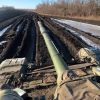Wisconsin, a state notoriously divided by politics, bucked national trends in April when it pressed forward with in-person midterm elections during the pandemic, despite objections of the Democratic governor, Tony Evers. Faced with a sudden exodus of volunteer poll workers, Milwaukee consolidated 180 polling locations in five, resulting in hours-long wait times.
Having had six months to prepare for fall elections – stocking up on PPE, creating plans for cleaning, and finding enough volunteers to work the polls – experts and election officials expect a smoother process on 3 November. But the wave of coronavirus outbreaks that first walloped the nation’s coastal areas has now crashed on the midwest. Wisconsin cities made up seven out of 10 areas with the highest share of Covid cases relative to their populations, according to a New York Times analysis.
This week, when early voting stations opened for residents to submit absentee ballots in person, officials put their preparations to the test. According to the Wisconsin election commission, 1.1 million people had returned their ballots by mail or in person as of Thursday – a record number of early votes for the state. (Wisconsin calls in-person early voting ballots absentee.)
By 6.30am Tuesday, when an early voting location opened at Bay View library in Milwaukee, the parking had filled with cars and a line snaked around the corner of the building. It moved swiftly, and spirits seemed high, with cheers and fist-pumps from voters who left the library happy to have submitted their ballots in person.
“I didn’t want to wait in line on election day,” said Stephen Gribble, 46. “Without getting too political, I wanted to make sure I did my part to get a certain someone out of office. And I wanted to come in person to make sure it was done right.”
The desire to have ballots properly counted, coupled with concerns over postal service delays, was echoed by a number of voters, including Craig Nickels, who delivered his ballot in person later that day. “There has been reporting by credible news outlets that even with concerns over Covid, I just felt more comfortable handing in my ballot at an official location,” Nickels said.
I just felt more comfortable handing in my ballot at an official location
Craig Nickels
In Wausau, a city of 38,000 in north central Wisconsin, officials of the region’s hospital system have implored residents to wear masks and avoid crowds in light of the region’s alarming case numbers – the nation’s sixth highest per capita. In response, Leslie Kremer, city clerk, said Wausau had installed sneeze guards at polling stations, assigned workers to clean and disinfect stations between voters, and will appoint monitors to make sure voters are following physical distance guidelines.
Still, she said some poll workers have expressed concern over voters who come in without masks – something for which voters can’t be turned away. “We’d like to see everyone wearing masks, but the law tells us we can’t enforce that,” Kremer said.
In Shawano, a city of 9,000 north-west of Green Bay that was forced to close city buildings amid surging case numbers, the city will turn to curbside voting, allowing people to cast ballots from their vehicles. In between, workers will sanitize pens and clipboards.
“So far everybody has loved it,” said the city clerk, Lesley Nemetz. “They don’t have to get out of their cars, which is good because it’s kind of chilly out.”
Due in part to voter mobilization campaigns, Wisconsin has seen an explosion of absentee ballots, exceeding that of years past and accounting for more than a third of the total votes counted in Wisconsin in 2016. The mail-in boom, part of a national trend this year, means that some Wisconsin communities have already exceeded half the total turnout they saw in 2016.
But less than two weeks before election day, a crucial deadline remains in flux. This month, a federal appeals court handed Republicans a victory when it blocked an extension to the deadline for receiving absentee ballots, which could lead to fewer ballots being counted in a state that went to Trump by a razor-thin margin of 23,000 votes in 2016. Democratic groups have appealed the decision to the supreme court and a decision is pending.
Now city clerks must prepare for last-minute changes to when ballots must be received in order to count. “It definitely doesn’t make running an election any easier, but as long as you’re paying attention, and have a plan in your back pocket for what to do if things change, you’ll be OK,” Nemetz said.
But some experts say it won’t hinder most voters. “This year it looks likely that the majority of votes in Wisconsin could be submitted before election day – that’s a huge change and it’s significant,” said Barry Burden, political science professor at University of Wisconsin – Madison and director of the Elections Research Center.
Burden attributes the trends to a response to the pandemic, with voters wanting to avoid exposure to Covid-19 while waiting in line to vote, but also to an unprecedented enthusiasm for early voting. And while voters in larger metropolitan areas and more affluent suburbs have so far submitted absentee ballots both in-person and through mail at higher rates, clerks in smaller and mid-sized cities say they have noticed similar trends.
In the city of Antigo, population 7,800, Kaye Matucheski, city clerk, said she had been surprised by the number of absentee ballots they had received. “This is my seventh presidential election, and we have had more absentees by double than I’ve ever had,” she said.
In Antigo and the surrounding Langlade county, where the seven-day average of Covid cases is one of the state’s highest, Matucheski suspects the pandemic accounts for some of the increase in absentee ballots. The rest, she chalks up to political interest.
“It’s the pandemic, but it’s also politics and the state of the world that has more people interested in voting. We’ve had people that lived here for years and years and have never voted, and this election is drawing them out,” Matucheski said.























































Свежие комментарии